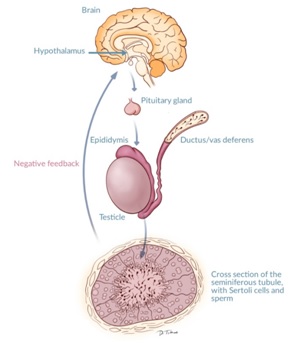

Context
A new study found that the testosterone treatment increases the risk of cardiovascular events such as arrhythmia, heart attack, and stroke, in the short to medium terms.
About
Hypogonadism:
- It is a condition caused by the deficiency of the male sex hormone, testosterone.
- Types - There are two types of hypogonadism: primary and central.
- Primary hypogonadism means that you don’t have enough sex hormones in your body due to a problem in your gonads.
- Your gonads are still receiving the message to produce hormones from your brain, but they aren’t able to produce them.
- In central (secondary) hypogonadism, the problem lies in your brain.
- Your hypothalamus and pituitary gland, which control your gonads, aren’t working properly.
- Symptoms - Sexual dysfunction, weakening of bones and muscles, and reduced quality of life.
- Risk factors include ageing (as testosterone levels decline with age), obesity and diabetes.
- Worldwide, 2% of men aged over 40 are affected, and this is growing as the population gets older.

Testosterone replacement therapy:
- Testosterone replacement therapy is the standard treatment for hypogonadism, which can cause sexual dysfunction, weakening of bones and muscles, and reduced quality of life.
- Prescribing of testosterone for hypogonadism is increasing globally, but conflicting messages about its safety may have led to many patients not receiving the treatment.
- Impacts - Testosterone treatment significantly reduced serum total cholesterol, HDL, and triglycerides.
- However, there were no significant differences in LDL, blood pressure, glycaemic parameters, diabetes incidence, and prostate adverse outcomes.

